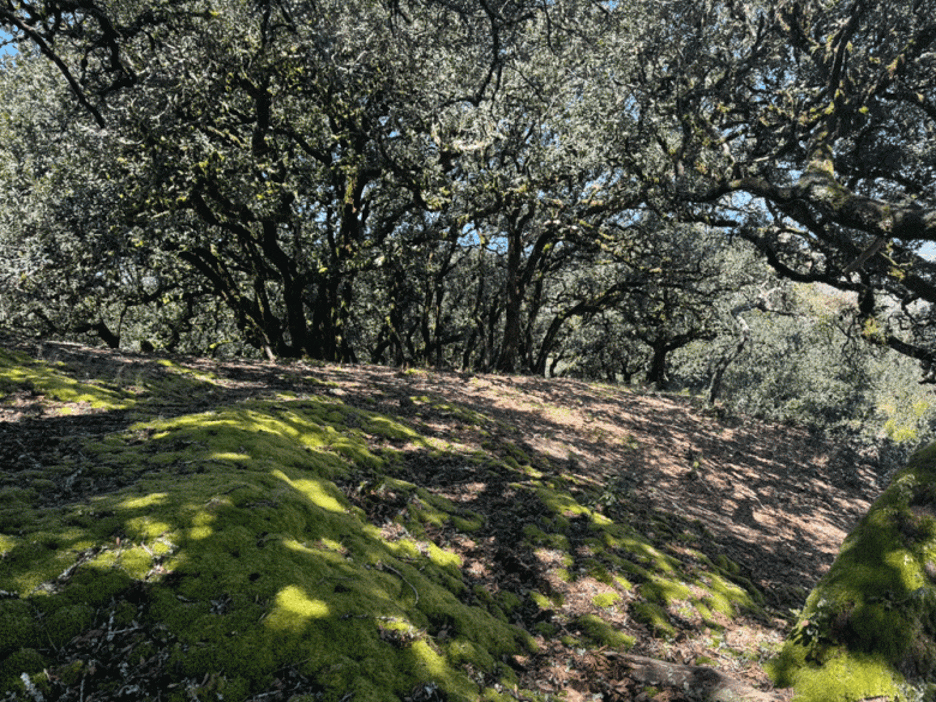by Karen Telleen-Lawton, Noozhawk Columnist (Click here for the original in Noozhawk)
April 21, 2025
Among the thousands of participants in the Hands Off! rally April 5, I spied a woman whose sign read, “It is so dire even the introverts are here!”
I applaud what likely required a large measure of courage for her to march in a large crowd, plus hold a sign publicizing her feelings.

Action and voice are strictly necessary in a functioning democracy. One consequence of our frenetic lives and the chaotic political climate, however, is that solitude is rare.
Without some time alone to sit and experience our thoughts, we are set adrift in the chaos.
If you are unaccustomed to sitting in silence, solitude can feel boring, selfish or even rebellious. In practice, however, you can quickly sense its rightness.
As your breath slows down, your thoughts start to untangle. Silence allows your heart to catch up with your mind. Permitting your brain downtime may surface deeper thoughts throughout the rest of your day.
After some period and some practice, you can sit and observe your thoughts without judgement. When your ego concedes to stepping aside, your reactions can teach you about yourself. In the silence, you may find what you need, even if — or especially if — you don’t understand what that is in the moment.
Giving voice to the soul accesses your most important teacher.
Author and speaker Parker Palmer writes about the importance of connecting with ourselves.
“Just as many of us are removed from contact with the natural world through urban living or busy lives, so too do we live distanced from the inner nature of our soul,” he writes in “Geography of Grace.”
“With the same urgency, so the soul needs for this kind of attunement and nurturance,” Palmer says. “Cut off from the land, we lose our sense of … belonging on this earth; when we are out of touch with our souls our lives become barren, starved at the roots of what deeply animates us.”
Recently, a good friend who was dealing with disillusionment in her life’s work found healing in meditation. She followed a simple book called “Just Sit – a Meditation Guidebook,” by Sukey and Elizabeth Novogratz.
Along with encouragement about the power of meditation, the book includes strategies for establishing a sitting routine over an eight-week period. After recommending it to another friend and to me, she sent us each a copy.
“Meditation is a way of training your mind to slow down, to be responsive, not reactive,” write the Novogratzes. “Meditation shines a light on fears and allows us to sit with them.”
They describe the practice as bringing you “… into your life and out of the constant chatter that’s going on in your head.”
Prayerful leaders of many traditions including Gautama Buddha (Buddhist), Maimonides (Jewish), Thomas Merton and Teresa de Avila (Christians), and Rumi (Islamic) have practiced meditation. Atheist Sam Harris is prominent in the mindfulness movement and developed a meditation app.
Pico Iyer, author of “The Art of Stillness,” encourages, “Almost any practice that allows you to open space in your day and your head seems invaluable.”
Importantly, Iyer observes: “The point of being alone is to be able to give more to others and to be a more useful member of society.”
As we negotiate this epic period in our lives as Americans, it feels essential to develop or continue some practice that allows you to open your mind, create space, and observe yourself as a participant in the universe.
If you claim — or reclaim — your religious, spiritual, or soul self, you allow yourself to refresh.
As “Just Sit” explains: “Meditation is about you getting to know you, finding your inner peace and goodness, and falling in love with the whole world.”
Then you can bring your best self to the table — to speak, to march, to rally, to write — for a better world.

Karen Telleen-Lawton, Noozhawk Columnist
Karen Telleen-Lawton is an eco-writer, sharing information and insights about economics and ecology, finances and the environment. Having recently retired from financial planning and advising, she spends more time exploring the outdoors — and reading and writing about it. The opinions expressed are her own.


